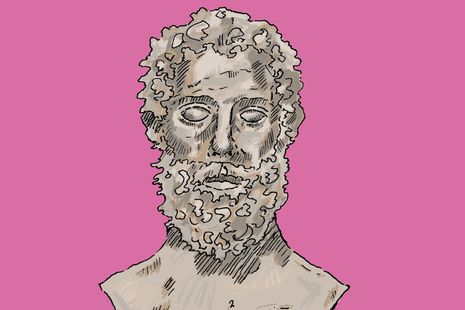Aeschylus in the trenches
Sydney Heintz considers how Greek tragedies can inform our current political mindsets

Like Athena’s casting vote in the Eumenides, Aeschylus’s participation in the Persian wars acquitted him of a potentially life-threatening trial of his own. Aristotle writes that he was accused of impiety for revealing an ancient cult’s secrets on stage, though other accounts claim that an angry mob attempted to kill him (reason unspecified). Either way, Aeschylus recognised that the Battle of Marathon (490 BC) had served him – an Orestes in his own right – extremely well, not least because the inscription on his tombstone reads:
’Beneath this stone lies Aeschylus, son of Euphorion, the Athenian,
who perished in the wheat-bearing land of Gela;
of his noble prowess the grove of Marathon can speak,
and the long-haired Persian knows it well.’
There is no mention of his celebrated career as dramatist, nor that he lost a brother at Marathon, too. Aeschylus’s tragedies therefore constitute a very peculiar sort of veteran literature: written in the trembling wake of the first electorate, the plays bear witness to a period of large-scale political upheaval in which a population becomes newly attuned to the rewiring of its inner constitutional logic. In other words, Aeschylus records nothing less than the beginnings of democracy itself: what it does to military city-states and, importantly, to their literary output.
“Written in the trembling wake of the first electorate, the plays bear witness to a period of large-scale political upheaval”
That the immediate context of Aeschylean tragedy should have become so obscured over time speaks, I think, to our discomfort with texts underpinned by value systems alien to our own. To understand Aeschylus, one must abandon modern progress narratives and get to grips with Classical Age values such as philia, symmachia, and eirēnē – rough equivalents to friendship, formalised alliances, and peace. These terms were used to describe relationships between states as much as individuals: Athens could reach eirēnē with Sparta in the same way friends might after a fight. The wider political picture was therefore bound up in the very language of seemingly personalist intrigue – on the responsibility of parenthood, the nature of legacy, or the justice of revenge, to name a few. This overlap is registered in the transfer of power to Cleisthenes in 510 BC, whose reforms foregrounded the deme, or suburb, over the family unit. (Aeschylus himself lived in one such suburb, the deme of Eleusis, before beginning his career in the military.)
“The Tragedy Paper at Cambridge encourages us to think in this way about the immediate political reality of figures as far apart as Euripides and Racine, Shakespeare and Ibsen”
To return to our epitaph, Aeschylus casts himself not as a tragedian, but as an Athenian citizen who has witnessed the new sovereignty of the Demos become an inseparable part of the political system of his polis. This post-war reading of Aeschylus resurfaced in the publication of the first Loeb edition of the tragedies in 1922, wherein editor Herbert Weir Smyth looks to Aeschylus as “the only Athenian representative in literature of this age crowded with events of far-reaching importance for the city-state, […] an age represented in war and statesmanship by such giant figures as Miltiades, Themistocles, Aristeides, and Cimon.” That is to say, Aeschylus lives in an age of Allies and Central Powers, imperial rivalry, and wars of attrition not unlike Prometheus’s regenerating liver – destabilised on all sides, the Aeschylus of the Treaty of Versailles emerges like a phantom in the firing line of Europe.
Aeschylus is not only concerned with war, of course, though I have attempted to show that there is merit in reading him as an outcome of one, especially in a time when veteran literature could help us respond to our own Miltiades and Cimons. The Tragedy Paper at Cambridge encourages us to think in this way about the immediate political reality of figures as far apart as Euripides and Racine, Shakespeare and Ibsen, and the ways in which they do, or do not, resemble one another. More generally, it teaches us the importance of understanding fundamentally alien societies and how their paradigms compare with ours. The Greeks did not think in terms of nation states and NATO alliances, and yet they remain relevant to our management of foreign political affairs, in the same way Smyth picked up on their affinities with inter-war Europe. Now, in the age of Putin and Trump, Aeschylus trains us to understand deep internal statecraft in ways daily headlines cannot – it depends, as it did for Orestes, on us realising our political relevance, and the casting vote that may accordingly be our own.
 Arts / Exploring Cambridge’s modernist architecture20 January 2026
Arts / Exploring Cambridge’s modernist architecture20 January 2026 Comment / The (Dys)functions of student politics at Cambridge19 January 2026
Comment / The (Dys)functions of student politics at Cambridge19 January 2026 Theatre / The ETG’s Comedy of Errors is flawless21 January 2026
Theatre / The ETG’s Comedy of Errors is flawless21 January 2026 News / Write for Varsity this Lent16 January 2026
News / Write for Varsity this Lent16 January 2026 News / Report suggests Cambridge the hardest place to get a first in the country23 January 2026
News / Report suggests Cambridge the hardest place to get a first in the country23 January 2026










